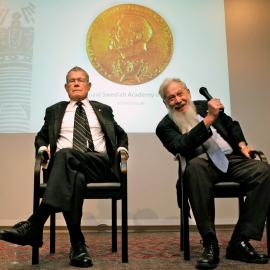In “The Dismal Kingdom” (March/April 2020), the economist Paul Romer excoriates his profession for causing many of the United States’ current problems—from lower life expectancy to the opioid epidemic to subprime lending. Romer reaches this verdict in the course of reviewing two recent books, Binyamin Appelbaum’s The Economists’ Hour and Nicholas Lemann’s Transaction Man, which, he writes, “converge on the conclusion that the economists at the helm are doing more harm than good.” Romer largely endorses that conclusion—an astonishing charge when advanced by a distinguished economist such as himself.
Yet in making his case, Romer relies on problematic causal claims and overly broad characterizations. His argument is most suspect when he faults certain individuals—such as Thomas Schelling, who helped popularize the use of cost-benefit analysis to inform government policy. Romer criticizes Schelling, incorrectly, for blurring the distinction between empirical questions, such as how much it costs to save lives, and normative questions, such as how much society should pay to save lives. But if society must choose how to spend limited resources, it is not surprising that one of the (albeit imperfect) metrics includes the dollar sign. Cost-benefit analysis and cost-effectiveness analysis are tools with advantages and limitations; it is one thing to point out their limitations, another to come up with better tools.
Not all economists are heralds of enlightened public policy, but it is a more heterogeneous profession than Romer’s critique suggests. He should be thanked for reminding economists that some of them have ignored or even perpetuated the familiar failures of capitalism. But he seems to suggest that all economists bow at the altar of free-market fundamentalism, and he implies that only the most orthodox strains of economic thought have influence. He does not mention those who doggedly advocate sensible government intervention, such as Anne Case, Angus Deaton, Paul Krugman, and many others. Policymakers have too often failed to heed the advice of such public-minded economists. But Romer ought to have acknowledged their constructive contributions to economic development, environmental protection, educational opportunity, and the struggle against poverty and inequality.
In his plea for humility, Romer beseeches his fellow economists to just “say no when government officials look to [them] for an answer to a normative question.” That is a courageous suggestion, and one that could stimulate discussion about the role of science in society. But especially now, when the COVID-19 pandemic requires governments everywhere to embrace science, it is dangerous to scapegoat economists—or any scholars who understand collective action and stand against leaders who reject scientific evidence.
You are reading a free article.
Subscribe to Foreign Affairs to get unlimited access.
- Paywall-free reading of new articles and a century of archives
- Unlock access to iOS/Android apps to save editions for offline reading
- Six issues a year in print, online, and audio editions
